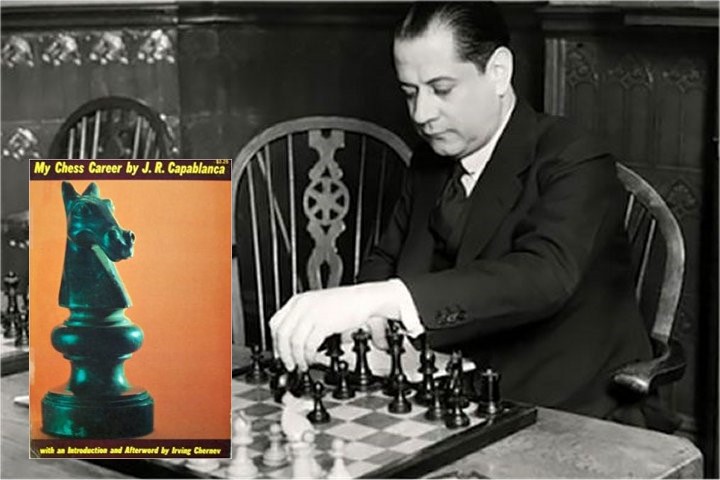Dedicated to Miguel Ángel Sánchez, biographer of Capablanca
A fine book about a great career
In 1921 Capablanca defeated Emanuel Lasker, who since winning the title from Wilhelm Steinitz in 1894 had been World Champion for 27 years, in their title match in Havana to become the third World Champion in the history of chess. One year before, in 1920, Capablanca had published his famous book "My Chess Career", an autobiographical work in which the Cuban shows a sincerity and frankness rarely seen in books written by chess masters of his time. Although many of his moves are difficult to predict, his style still radiates great luminosity and is generally easy to understand.
With famous classical examples from the works of the giants, the author talks in detail about principles of chess and methods of play that we can use during every stage of the game.
Capablanca’s pedagogical inclination
Many experts and critics have regarded Capablanca as the greatest natural talent in the history of chess. Beyond his creations over the board, his inclination for pedagogy and his desire to popularize the game led him to appear in radio programs and conferences — with elegance and neatness, he described in detail and with simple words, the twists and turns of his games. In these conferences, the maestro showed his sober style, oriented towards simplification and transparency.
Many of these experiences were incorporated into his books — among which "A Primer of Chess", "My Chess Career" and "Chess Fundamentals" stand out.
"My Chess Career" is a kind of autobiography, in which the Cuban master describes the evolution of his playing style and shows a sincerity and frankness, which were rarely seen in books written by chess masters at the time.
Capablanca writes about how his understanding and strength of play has developed. For example, he mentions that he did not know much about openings as a young player, but that he was good in the middlegame and very strong in the endgame. Later, he talks about how his style had matured, pushing him to become a more complete player.
However, in the annotations of most of the games, Capablanca presents shallow analyses with few variations and short, very synthetic notes, giving the reader a sensation that the author could have developed much more on the subject.
Sincerity and transparency
As a player, Capablanca — the only Latin American World Champion — was a fine strategist, with a subtle ability to simplify the position into advantageous endings.
In the analyses of his games Capablanca often describes strategic principles that are still valid today. Capablanca rarely lost but he admitted that he had learned much more from his few defeats than from his many victories.
Alekhine, who defeated Capablanca in their World Championship match in Buenos Aires in 1927 and took the title from him, wrote about Capablanca:
His incomparable abilities began to show around the 1914 Saint Petersburg Tournament, when I also came to know him personally. Neither before nor since have I seen — and I cannot imagine doing so — such rapid understanding of the positions as what I saw in Capablanca around that time.
These natural gifts were accompanied by an attractive physique and a winning personality.
Looking back on his life, I think that perhaps Capablanca’s most dangerous enemies were his excessive confidence in his talent and understanding of the game, his lack of systematic training, and the high blood pressure that began to undermine his health after he reached the age of 40.
"My Chess Career" (1920) is a classic of chess literature and a tribute to Capablanca's great career and outstanding talent.
He was a child prodigy and he is surrounded by legends. In his best times he was considered to be unbeatable and by many he was reckoned to be the greatest chess talent of all time: Jose Raul Capablanca, born 1888 in Havana.
Links























